多元智能-中英文对照
- 格式:doc
- 大小:46.00 KB
- 文档页数:6
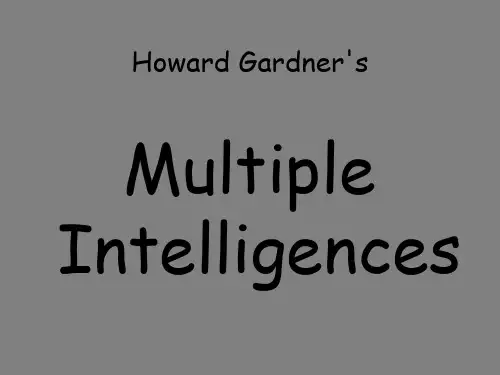
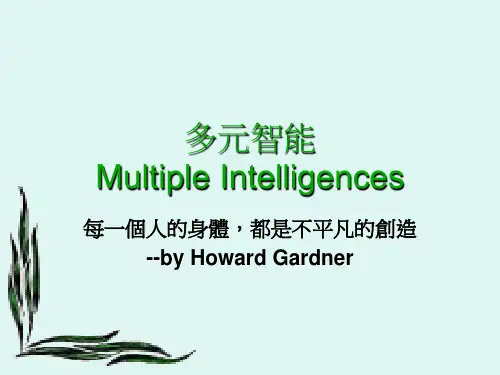
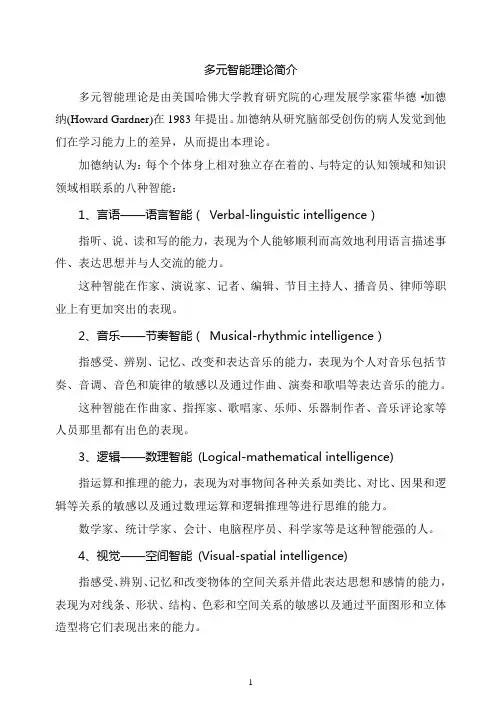
多元智能理论简介多元智能理论是由美国哈佛大学教育研究院的心理发展学家霍华德·加德纳(Howard Gardner)在1983年提出。
加德纳从研究脑部受创伤的病人发觉到他们在学习能力上的差异,从而提出本理论。
加德纳认为:每个个体身上相对独立存在着的、与特定的认知领域和知识领域相联系的八种智能:1、言语——语言智能(Verbal-linguistic intelligence)指听、说、读和写的能力,表现为个人能够顺利而高效地利用语言描述事件、表达思想并与人交流的能力。
这种智能在作家、演说家、记者、编辑、节目主持人、播音员、律师等职业上有更加突出的表现。
2、音乐——节奏智能(Musical-rhythmic intelligence)指感受、辨别、记忆、改变和表达音乐的能力,表现为个人对音乐包括节奏、音调、音色和旋律的敏感以及通过作曲、演奏和歌唱等表达音乐的能力。
这种智能在作曲家、指挥家、歌唱家、乐师、乐器制作者、音乐评论家等人员那里都有出色的表现。
3、逻辑——数理智能(Logical-mathematical intelligence)指运算和推理的能力,表现为对事物间各种关系如类比、对比、因果和逻辑等关系的敏感以及通过数理运算和逻辑推理等进行思维的能力。
数学家、统计学家、会计、电脑程序员、科学家等是这种智能强的人。
4、视觉——空间智能(Visual-spatial intelligence)指感受、辨别、记忆和改变物体的空间关系并借此表达思想和感情的能力,表现为对线条、形状、结构、色彩和空间关系的敏感以及通过平面图形和立体造型将它们表现出来的能力。
画家、雕刻家、司机、向导、建筑师、水手等都是这种智能强的人。
5、身体——动觉智能(Bodily-kinesthetic intelligence)指运用四肢和躯干的能力,表现为能够较好地控制自己的身体、对事件能够做出恰当的身体反应以及善于利用身体语言来表达自己的思想和情感的能力。
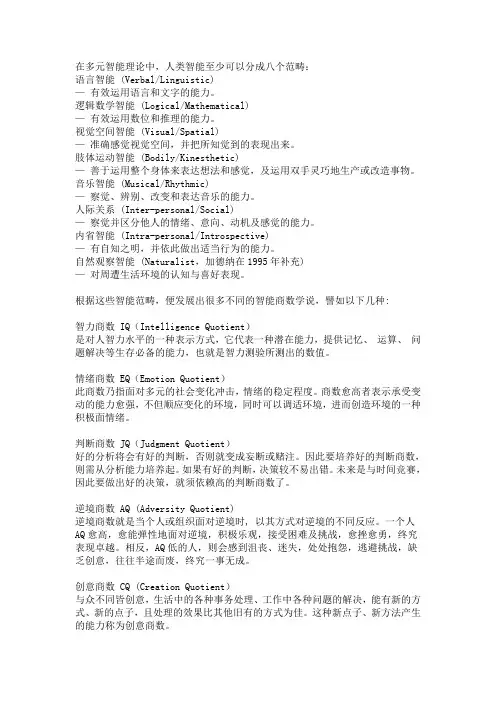
在多元智能理论中,人类智能至少可以分成八个范畴:语言智能 (Verbal/Linguistic)—有效运用语言和文字的能力。
逻辑数学智能 (Logical/Mathematical)—有效运用数位和推理的能力。
视觉空间智能 (Visual/Spatial)—准确感觉视觉空间,并把所知觉到的表现出来。
肢体运动智能 (Bodily/Kinesthetic)—善于运用整个身体来表达想法和感觉,及运用双手灵巧地生产或改造事物。
音乐智能 (Musical/Rhythmic)—察觉、辨别、改变和表达音乐的能力。
人际关系 (Inter-personal/Social)—察觉并区分他人的情绪、意向、动机及感觉的能力。
内省智能 (Intra-personal/Introspective)—有自知之明,并依此做出适当行为的能力。
自然观察智能 (Naturalist,加德纳在1995年补充)—对周遭生活环境的认知与喜好表现。
根据这些智能范畴,便发展出很多不同的智能商数学说,譬如以下几种:智力商数 IQ(Intelligence Quotient)是对人智力水平的一种表示方式,它代表一种潜在能力,提供记忆、运算、问题解决等生存必备的能力,也就是智力测验所测出的数值。
情绪商数 EQ(Emotion Quotient)此商数乃指面对多元的社会变化冲击,情绪的稳定程度。
商数愈高者表示承受变动的能力愈强,不但顺应变化的环境,同时可以调适环境,进而创造环境的一种积极面情绪。
判断商数 JQ(Judgment Quotient)好的分析将会有好的判断,否则就变成妄断或赌注。
因此要培养好的判断商数,则需从分析能力培养起。
如果有好的判断,决策较不易出错。
未来是与时间竞赛,因此要做出好的决策,就须依赖高的判断商数了。
逆境商数 AQ (Adversity Quotient)逆境商数就是当个人或组织面对逆境时, 以其方式对逆境的不同反应。
一个人AQ愈高,愈能弹性地面对逆境,积极乐观,接受困难及挑战,愈挫愈勇,终究表现卓越。

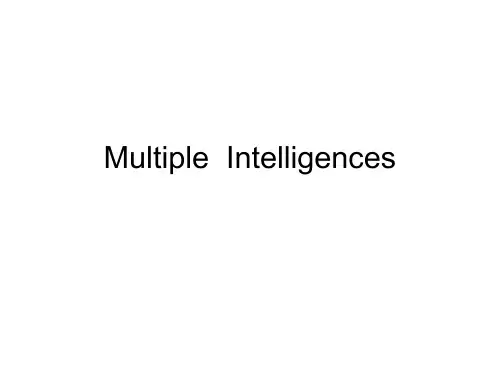
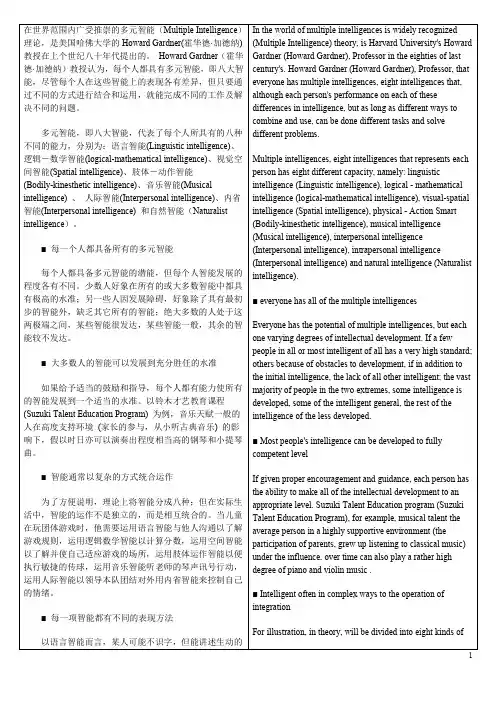
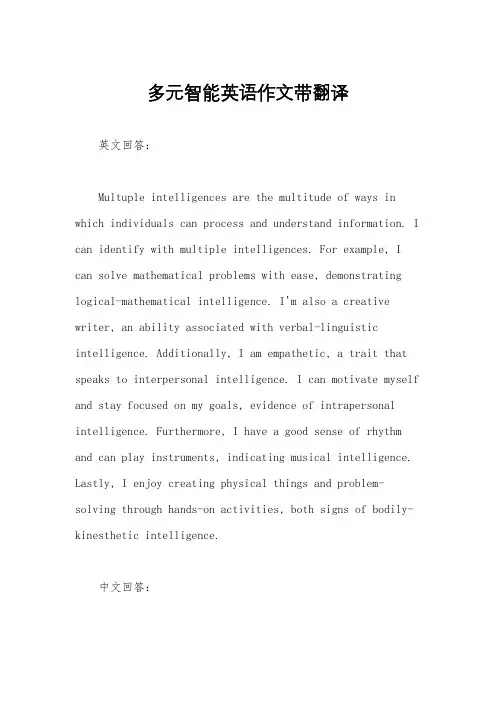
多元智能英语作文带翻译英文回答:Multuple intelligences are the multitude of ways in which individuals can process and understand information. I can identify with multiple intelligences. For example, I can solve mathematical problems with ease, demonstrating logical-mathematical intelligence. I'm also a creative writer, an ability associated with verbal-linguistic intelligence. Additionally, I am empathetic, a trait that speaks to interpersonal intelligence. I can motivate myself and stay focused on my goals, evidence of intrapersonal intelligence. Furthermore, I have a good sense of rhythm and can play instruments, indicating musical intelligence. Lastly, I enjoy creating physical things and problem-solving through hands-on activities, both signs of bodily-kinesthetic intelligence.中文回答:多元智能是指个体处理和理解信息的方式的多样性。
我可以认同多种智能类型。
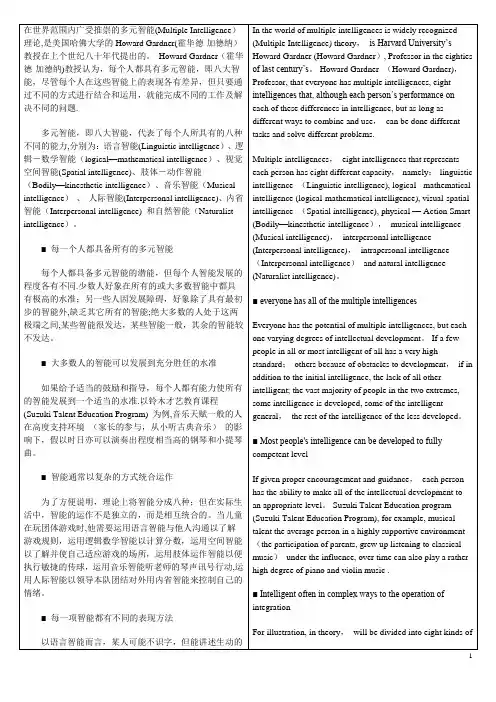
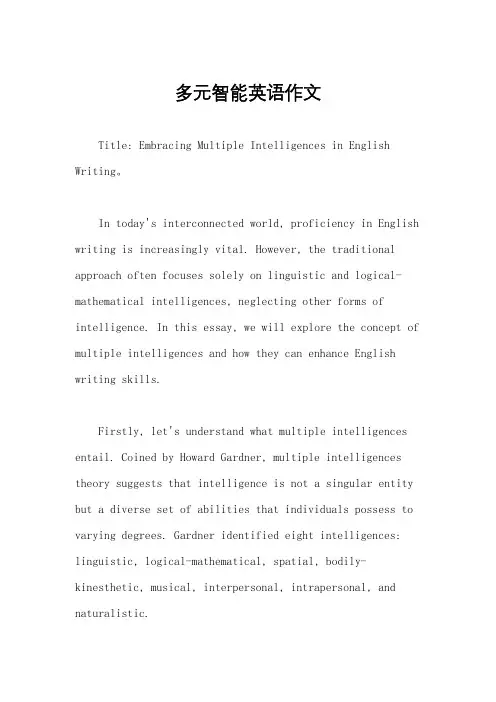
多元智能英语作文Title: Embracing Multiple Intelligences in English Writing。
In today's interconnected world, proficiency in English writing is increasingly vital. However, the traditional approach often focuses solely on linguistic and logical-mathematical intelligences, neglecting other forms of intelligence. In this essay, we will explore the concept of multiple intelligences and how they can enhance English writing skills.Firstly, let's understand what multiple intelligences entail. Coined by Howard Gardner, multiple intelligences theory suggests that intelligence is not a singular entity but a diverse set of abilities that individuals possess to varying degrees. Gardner identified eight intelligences: linguistic, logical-mathematical, spatial, bodily-kinesthetic, musical, interpersonal, intrapersonal, and naturalistic.Now, let's delve into how these multiple intelligences can be integrated into English writing:1. Linguistic Intelligence: This is the most obvious intelligence associated with English writing. It involves sensitivity to spoken and written language, the ability to learn languages, and the capacity to use language to accomplish certain goals. Writers with high linguistic intelligence excel in vocabulary usage, sentence structure, and storytelling techniques.2. Logical-Mathematical Intelligence: While seemingly unrelated to writing, logical-mathematical intelligence plays a crucial role in organizing thoughts, structuring arguments, and analyzing information. Writers with this intelligence excel in constructing logical outlines, making connections between ideas, and presenting information coherently.3. Spatial Intelligence: Spatial intelligence involves the ability to perceive the visual world accurately and toperform transformations on those perceptions. In English writing, this intelligence aids in creating vivid descriptions, crafting imagery, and organizing information spatially, such as in diagrams, charts, or mind maps.4. Bodily-Kinesthetic Intelligence: This intelligence relates to physical movement and the ability to controlone's body movements skillfully. While it may seem unconventional, bodily-kinesthetic intelligence can enhance English writing through activities like gesture-supported storytelling, role-playing characters to understand their perspectives better, or even through activities like dance or physical exercise to stimulate creativity.5. Musical Intelligence: Musical intelligence involves skill in the performance, composition, and appreciation of musical patterns. In English writing, this intelligence can enhance rhythm, pacing, and tone. Writers with musical intelligence may find it easier to create engaging prose or poetry with rhythmic patterns and melodic cadences.6. Interpersonal Intelligence: This intelligencepertains to understanding and interacting effectively with others. In English writing, interpersonal intelligence can be utilized to create authentic dialogue, develop complex characters, and explore social dynamics within narratives.7. Intrapersonal Intelligence: Intrapersonal intelligence involves self-awareness and the ability to understand one's own emotions, motivations, and goals. Writers with high intrapersonal intelligence can draw from personal experiences, introspection, and reflection to add depth and authenticity to their writing.8. Naturalistic Intelligence: This intelligence involves sensitivity to and appreciation for the natural world. While it may not seem directly relevant to English writing, naturalistic intelligence can inspire descriptive imagery, metaphors, and themes drawn from nature.In conclusion, embracing multiple intelligences can significantly enrich English writing. By recognizing and harnessing the diverse strengths of each intelligence, writers can develop a more holistic and nuanced approach totheir craft. From linguistic precision to spatial creativity, from musical rhythm to interpersonal insight, each intelligence offers unique avenues for expression and communication in the realm of English writing.。
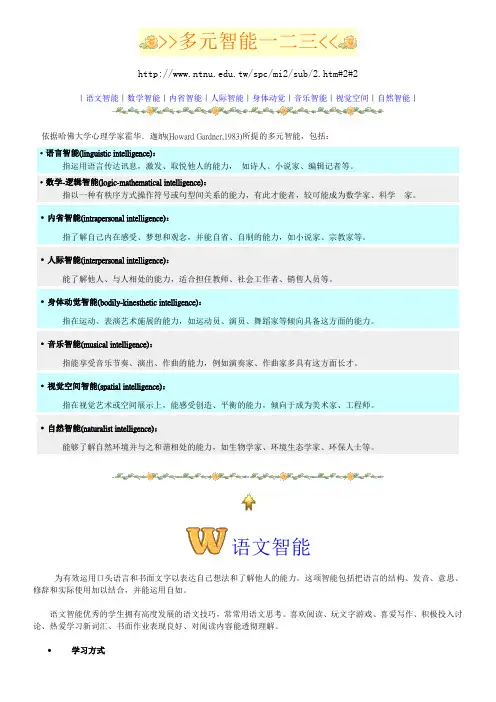
>>多元智能一二三<<.tw/spc/mi2/sub/2.htm#2#2|语文智能|数学智能|内省智能|人际智能|身体动觉|音乐智能|视觉空间|自然智能|依据哈佛大学心理学家霍华.迦纳(Howard Gardner,1983)所提的多元智能,包括:‧语言智能(linguistic intelligence):指运用语言传达讯息,激发、取悦他人的能力,如诗人、小说家、编辑记者等。
‧数学-逻辑智能(logic-mathematical intelligence):指以一种有秩序方式操作符号或句型间关系的能力,有此才能者,较可能成为数学家、科学家。
‧内省智能(intrapersonal intelligence):指了解自己内在感受、梦想和观念,并能自省、自制的能力,如小说家、宗教家等。
‧人际智能(interpersonal intelligence):能了解他人、与人相处的能力,适合担任教师、社会工作者、销售人员等。
‧身体动觉智能(bodily-kinesthetic intelligence):指在运动、表演艺术施展的能力,如运动员、演员、舞蹈家等倾向具备这方面的能力。
‧音乐智能(musical intelligence):指能享受音乐节奏、演出、作曲的能力,例如演奏家、作曲家多具有这方面长才。
‧视觉空间智能(spatial intelligence):指在视觉艺术或空间展示上,能感受创造、平衡的能力,倾向于成为美术家、工程师。
‧自然智能(naturalist intelligence):能够了解自然环境并与之和谐相处的能力,如生物学家、环境生态学家、环保人士等。
语文智能为有效运用口头语言和书面文字以表达自己想法和了解他人的能力。
这项智能包括把语言的结构、发音、意思、修辞和实际使用加以结合,并能运用自如。
语文智能优秀的学生拥有高度发展的语文技巧,常常用语文思考。
喜欢阅读、玩文字游戏、喜爱写作、积极投入讨论、热爱学习新词汇、书面作业表现良好、对阅读内容能透彻理解。
多元智能理论名词解释333多元智能理论,也称作多元智能理论(Multiple Intelligences Theory,MI Theory),是由美国心理学家汉姆费德曼(Howard Gardner)在1983年提出的一种新颖的心理学理论。
该理论认为,智力并不是单元智力,而是多样化的,可以分为九种属性。
这九种属性,他将其称为“多元智能”(Multiple Intelligences),它主要包括:语言智能(Linguistic Intelligence),视觉-空间智能(Visual-Spatial Intelligence),肢体-动觉智能(Bodily-Kinesthetic Intelligence),音乐智能(Musical Intelligence),社会智能(Social Intelligence),自然智能(Naturalistic Intelligence),逻辑智能(Logical-Mathematical Intelligence),个性智能(Personality Intelligence),及精神智能(Spiritual Intelligence)。
语言智能,又称文字熟记力,是指说话、读书、写作等文字活动所特有的智能核心,主要体现为语言技能,如记忆力、口头能力、书写能力等,其根本功能是理解及表达语言的能力。
它主要包括口头、书面语言的理解及应用能力,以及把握词语微妙意思、表达准确辩清的能力。
视觉-空间智能是指在空间上灵敏地理解、把握及运用事物与空间关系的能力,从视觉上灵活地把握物体位置及形态等特点,并通过像图形、图表、实物、轮廓等形式及方式表达出来。
肢体-动觉智能是指灵敏地理解自身动作、感知自身肢体及对外部刺激作出反应的能力,这种感觉又称为肢体辨识度,它与动物的本能反应一样,是智力中重要的一种。
音乐智能是指理解音乐及表现音乐的能力,音乐智能不仅包括了欣赏音乐的能力,更主要是指追求音乐知识、器乐技能、演唱技巧、理解及创作音乐的能力,及以音乐表达自身的能力。